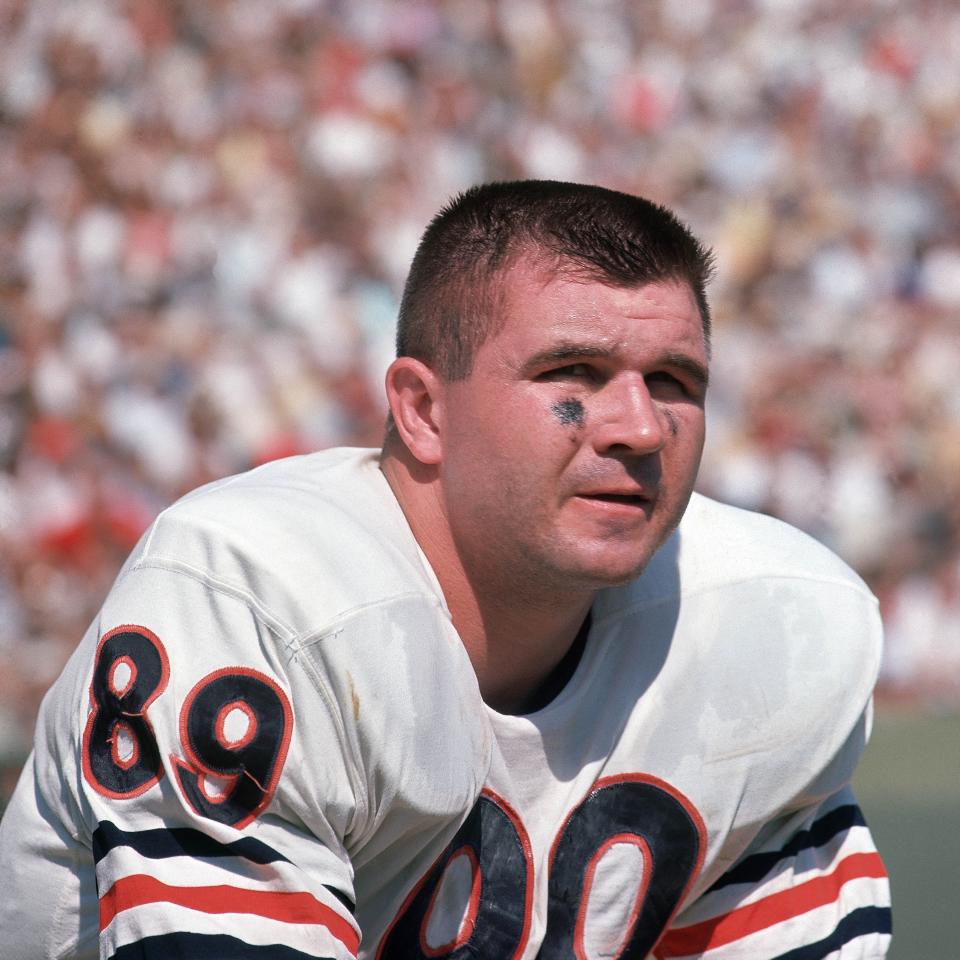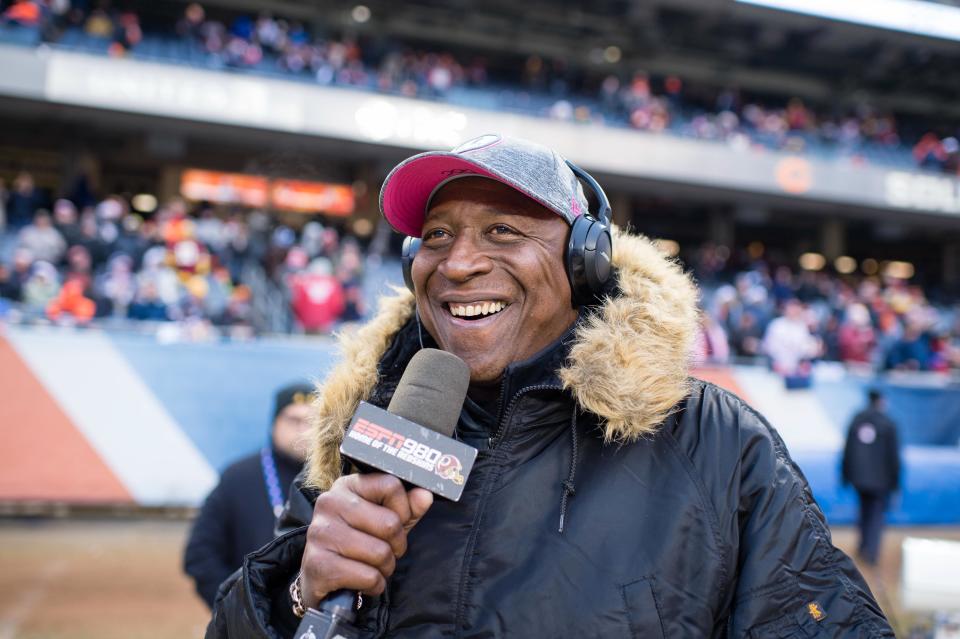Tim Tebow at TE? Four ex-NFL tight ends, including three Hall of Famers, weigh in
Let’s start with a warning for Tim Tebow, courtesy of Hall of Fame tight end Shannon Sharpe.
“Everything will be happening a lot quicker,” Sharpe told USA TODAY Sports, pondering the prospect of Tebow’s attempt for an NFL comeback as a tight end — a position he’s never played. “More times than not, you’re not down the field catching 40-yard balls. You’re running shallow crosses or 10-yard in-routes or out-routes. You’re catching it and guys are right on top of you. So you need to understand: ‘Where am I exposed?’
“Say I’m running a seam. Did I bend it too quick? Now the front-side safety will send me to the hospital. There are so many things I don’t think he understands because he’s never been exposed to that.”
There is no shortage of opinion regarding this new path for Tebow, 33, the University of Florida legend who washed out as an NFL quarterback and more recently chucked his pursuit of a baseball career. It’s expected he will reunite with his former college coach, Urban Meyer — they won two national championships together, with Tebow claiming a Heisman Trophy — and sign a free-agent contract with the Jacksonville Jaguars after an eight-year layoff from football.
Love him or loathe him, Tebow taking another crack at pro football adds yet another layer of drama, if not sizzle, on top of Meyer’s return to coaching and the presence of former Clemson quarterback Trevor Lawrence as the top pick in the NFL draft.
The crash course is coming for the man with the size (6-3, 245), athleticism and relevant intangibles … but no tight end experience.
To assess Tebow’s chances, USA TODAY Sports spoke to four former NFL tight ends — Hall of Famers Kellen Winslow, Mike Ditka and Sharpe, plus Rick “Doc” Walker, who won a Super Bowl with Washington — to break down what could be in store and other factors.
The toughest part of Tebow’s challenge
Winslow: “The route-running, I think he’ll pick up rather quickly. The catching will be second-nature. It’s going to be the physical play of blocking … and getting hit.”
Ditka: “The physicality of it all. If you’re a tight end and I don’t think you’re physical, I’m going to try to beat the heck out of you. That’s just what the linebackers will try to do. If they don’t think he’s physical enough, they’ll try to beat him up.”
Walker: “Getting hit in the face. He was a running quarterback when he won the Heisman Trophy. So he’s used to contact. That’s not going to faze him. He’s big enough. If he can get cracked in the skull and not get thrown off at that point…”
Sharpe: “It’s a lot more difficult running routes in a congested area. You’ve got people banging on you. The defensive ends you’ve got to block are bigger than you. And you’ve never blocked anybody. And he’s never caught a pass. You’re asking him to do something he’s never done in his entire life and you’re asking him to do it at the highest level. You’re asking an awful lot.”
'They wouldn't hit a dead man'
While the experts agreed that the make-or-break key will hinge on Tebow handling the physical demands, they realize it’s highly unlikely the Jaguars will try to use him as a conventional tight end aligned next to the tackle on the line of scrimmage with his hand in the dirt. Tebow is envisioned as an H-back, a hybrid position commonly called a “move tight end,” typically stationed off the line and often running across formations while in motion.
That’s how Hall of Fame coach Joe Gibbs largely used Walker during the 1980s. Since then, the tight end and H-back positions in a pass-happy league have evolved to essentially be viewed as big receivers, with tight ends who multi-task as blockers becoming rare.
“You know how many tight ends have played in this league and they wouldn’t hit a dead man,” Walker said. “But they've played and made a lot of money. If he can run a check-down, a circle route, a look-ey … why not?”
Ditka, who coached the Bears to a Super Bowl XX crown, maintained that if he were in Meyer’s shoes at the moment, he too would sign Tebow.
“Absolutely,” Ditka said. "Listen, I think he’s a good enough athlete. I think he deserves a shot. I’d give him a shot. No problem.”
The evolution of the game and position, Ditka added, makes it a reasonable gamble.

“The tight end today, they don’t call on them to do a whole heck of a lot of blocking anymore. He’s basically a receiver. So I think Tebow would be very, very capable and will probably do a good job in that area. I don’t see any problem with it.
"Now, if it was the tight end of 20 years ago where you had to block defensive ends, I think it’s a bit different. But they don’t have to do that anymore. They flank ‘em out there, split ‘em out five yards and they run routes. He’s a good enough athlete where he can beat those guys in the secondary. And I think he’ll be a darned good one.”
Added Winslow: “If he’s given a shot, I hope he takes advantage of it. As far as athletic ability, can he do it? Yeah, I think he can. The good thing about not having played in the last (eight) years is that no one’s beaten up on your body. He’s got fresh legs and hopefully doesn’t have nagging injuries. He should do well.”
Special treatment and privilege
Not everyone is so bullish on Tebow’s opportunity, particularly as it relates to non-football factors and the extended time away from the game. Walker points to the obvious connection of Meyer and Tebow’s appeal in Florida, while contrasting the plight of other developmental players who might only dream of such a break — especially eight years after last playing football.
“He’s given an opportunity that most are never given,” said Walker, a longtime radio host and analyst in the D.C. area who played nine NFL seasons. “It’s privilege. In life, we should know that better than anybody. Is he the kind of guy who can be great in the locker room? Hell, yeah. The dude is a stud, he’s a leader, he’s a special guy.
"But he’s also privileged, and not everyone gets that opportunity. I don’t think he’ll squander it. You won’t have to worry about him being late to meetings and not being prepared. Is it worth a shot when you’re in last place and this guy is like a legend in that region? This is economics, man. This is about revenue. So yeah, you take a shot at it because you’ve got nothing to lose."

Meyer, with thin depth at tight end, told USA TODAY Sports during a recent interview that if the Jaguars signed Tebow, the decision would swing with their belief that he could help the chances of winning. Meyer dismissed the notion that sentimentality would be a factor and was adamant that the potential signing would not be influenced by marketing or promotional value.
'Addicted to the fame'
Sharpe, though, wonders about the authenticity of Tebow’s comeback attempt and position switch after trying for three years to hack it as an NFL quarterback.
“The thing that I keep going back to is that he was asked to switch positions years ago, but it was beneath him,” Sharpe said. “What we’re seeing is that Tim Tebow is addicted to the fame of being a professional athlete.
"He couldn’t play quarterback, so it was, ‘If I can’t play quarterback, guess what I’ll do? I’m so talented, I’ll go play professional baseball.’ When that didn’t work out, it’s, ‘I’ll switch positions because I love the adulation that comes along with being a professional athlete.’ "
Tebow hasn’t publicly detailed his reasons for the comeback and position switch. Yet if the signing comes with the Jaguars, as expected, he will have plenty of chances to state his case.
Learning the physical part
Winslow can relate on at least a couple of levels. He didn’t play organized football until his senior year in high school and was placed at tight end by his coaches.
“The first time I got hit in a game, I went to the sideline crying,” Winslow recalled. “The physical part, I had to learn. Of course, I was 17 at the time. That’s different than being 33. I think he’ll be OK with that phase of it, but I can understand what he’s going through. This is new to him.”
People often tell Winslow he revolutionized the position as he blossomed in the Chargers’ “Air Coryell” offense. In his second season, in 1980, Winslow set a then-NFL record for tight ends with a league-high 89 receptions (breaking Ditka’s previous mark of 75).
“No, Don Coryell changed the position because he decided to take out the fullback and put in the second tight end at the time, because Bob Klein was the starting tight end,” Winslow said. "I was the one lucky enough to be on that team when Coryell said to Joe Gibbs and Ernie Zampese late one night in a meeting room, ‘Oh well. Put Kellen in there.’
“They were concerned about me being so young. My first year in the NFL was my sixth year of playing football. They were concerned about me getting off the line of scrimmage because I’m going up against grown men at defensive end and linebacker.
"So I became the move guy. That was the adjustment they made. They can do the same thing with Tebow, because getting off the line of scrimmage is going to be an issue.”
Can he do it?
What are the chances that Tebow will be successful?
Sharpe laughed.
“Successful? Are we saying if he makes the team it’s a success?” Sharpe said. “I think there’s a greater than 50% chance that he makes the team, simply because of where he is. He’s from Jacksonville. And he really helped that head coach get on the map in winning two national championships at the University of Florida.
“What do we always say: It’s not what you know. Sometimes, it’s not even how good you are. It’s who you know.”
Here’s a final thought, courtesy of Ditka:
“Good luck. I hope it works. They need another tight end.”
Follow USA TODAY Sports' Jarrett Bell on Twitter @JarrettBell.
This article originally appeared on USA TODAY: Tim Tebow at TE? Ex-tight ends weigh in: 'They'll try to beat him up'

 money
money 